The Limits of Papal Infallibility
Should we still be Catholic? Part 3
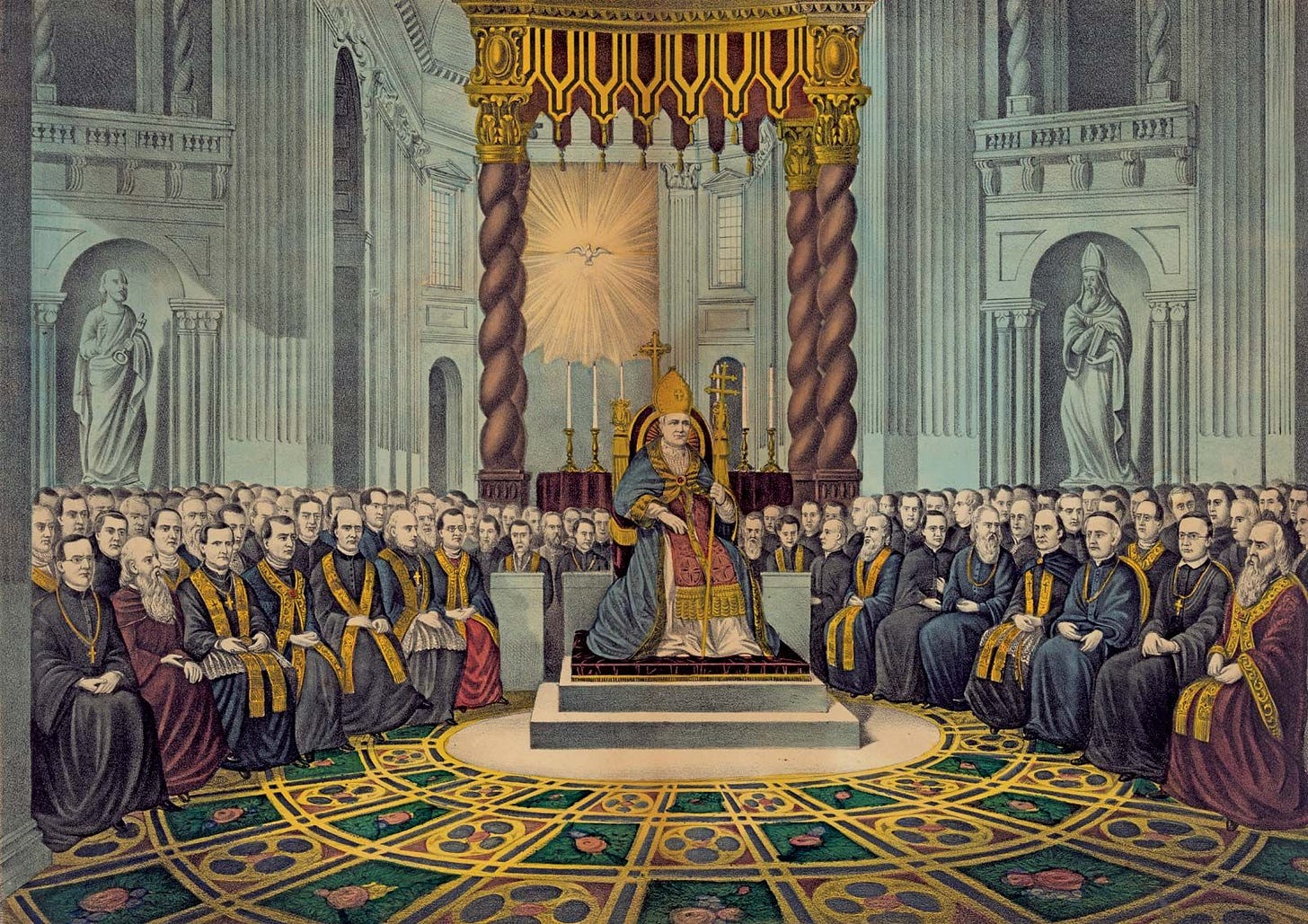
This is the third installment in an article series that revolves around the question, “should we still be Catholic?” Read the first and second articles.
Now that we’ve gone over some initial reasons to remain invested in the Catholic Church even in the midst of horrific scandals, I want to address an issue that gets raised not only by inquirers into Catholicism, but even by many seasoned Catholics who are confused about the current crisis. Can the traditional Catholic faith, with its seemingly exalted and lofty teachings about the Roman papacy, even co-exist with the reality of papal error in the first place? Here’s why I believe that it can.
As Dr. John Joy has persuasively shown in his book, Disputed Questions on Papal Infallibility, the extent to which Catholics are bound to believe in the pope’s infallibility is quite limited. Although it’s true that we’re supposed to give the “religious submission of intellect and will” to the Holy Father “even when he is not speaking ex cathedra,”1 such submission is not unconditional. That is, it’s sometimes acceptable to withhold our assent from these non-definitive papal teachings. We know this because, as the official notes on this text provided by the Theological Commission at Vatican II affirm, the religious submission in question concerns “what assent ought to be given to the teaching of the authentic magisterium below the grade of infallibility.”2 Pope St. John Paul II likewise explicitly taught that the Roman pontiff “does not possess [infallibility] as if he could dispose of it or count on it in every circumstance, but only when he speaks from the chair [ex cathedra].”3 This is relevant because, unless a doctrine is taught infallibly, it’s possibly erroneous and therefore one cannot be unconditionally bound to assent to that doctrine.
This is best illustrated with an example. For the sake of argument, let’s say that in Dignitas Infinita, Cardinal Fernández and Pope Francis taught that the death penalty is an intrinsic evil, comparable to both abortion and transgender surgeries (note: whether or not this is actually the case is completely irrelevant to the point I’m making here). Now, pretty much everyone agrees that this is a “non-infallible” teaching, however, there are some who hold that all Catholics are nonetheless unconditionally bound to accept it (i.e. submit their intellects and wills to it). The problem with this position is that, as Edward Feser and Joseph Bessette have demonstrated in their book, By Man Shall His Blood Be Shed: A Catholic Defense of Capital Punishment, the moral liceity of the death penalty has been infallibly taught by divine revelation. Genesis 9:6 and Romans 13:4 alone reveal that, according to God’s Word, it is lawful for civil rulers to execute evildoers. Not to mention the fact that God commands His people to carry out the death penalty throughout the Torah, and God cannot command moral evil.
Thus, for those who believe that Pope Francis’ teaching on the death penalty is “infallibly safe,” they’re in quite a pickle. How could it ever be “safe” for me to reject the teachings of Scripture? At most, one could have a reduced culpability for the sin of rejecting God’s Word if he truly didn’t know any better, but for people like myself who do know what Scripture teaches about the death penalty, what are we to do? If we’re absolutely bound by divine law to accept even non-infallible teachings of the pope, then we have to pick our poison: disobey God by rejecting His Word, or disobey God by rejecting His vicar. However, this is the very scenario that the Catholic Church teaches is impossible. This is the scenario that inspired Vatican I to develop its teaching on the infallibility of ex cathedra papal decrees in the first place!
If we are, by divine law, unconditionally bound to accept a teaching, then God cannot possibly allow that teaching to contradict His Word. That is, such a teaching must be infallible. It is logically incoherent to speak of Almighty God requiring you to believe X, even though X is not true. That would be tantamount to God lying, yet Scripture is clear that God cannot lie (Num 23:19; Titus 1:2; Heb 6:18). Therefore, either a doctrine is infallibly taught and requires our unconditional assent, or a doctrine is non-infallibly taught and only requires our conditional assent. Since the Church has explicitly told us that any individual papal teaching below the grade of ex cathedra is non-infallible, it follows that these teachings only require conditional assent.
Now, what am I not saying? I’m not saying that Catholics can freely dissent from the pope whenever he teaches anything non-infallibly. I’m not even saying that the ex cathedra modality is the only way in which the pope participates in the Church’s charism of infallibility (more will be said on this below). Rather, I’m simply pointing out the logical consequence of affirming, as the Church does, that the pope doesn’t always teach infallibly: insofar as a particular teaching is not infallible, that teaching cannot automatically demand our unconditional assent. This is not my pet theological opinion, this is just reason. Don’t shoot the messenger!
From here, one can see how the reality of papal error is recognized in Catholicism: “if there are non-infallible expressions of the authentic magisterium, then it is possible for the authentic magisterium to teach error. For what is not infallible is fallible; and what is fallible is able to fail.”4 This obviously explains how it’s possible for a pontiff like Francis to have taught theological errors even in his official capacity as pope: he taught non-definitively and thus non-infallibly. If teaching infallibly means that the doctrine being taught must be believed by Catholics lest they forfeit their membership in the Church (i.e. unconditional assent), then teaching non-infallibly means that the doctrine being taught can be dissented from by Catholics without risking their ecclesial standing (provided they have extremely good theological and or dogmatic reasons for their dissent). Joe Heschmeyer summarized this logic underlying papal infallibility well: “believers will never have to choose between membership in the visible Catholic Church and fidelity to the gospel. We’ll never have to choose schism or heresy.”5 Running with this same idea, Dr. Joy brings it all together:
The charism of infallibility is bestowed on the Church by God in order to protect the faithful from being forced by holy obedience into error in matters of faith or morals. Since the solemn judgments or definitions of the pope are strictly binding in conscience, if the pope were able to err in such judgments, then all Christ’s faithful could be obliged to believe something against the Faith, which would be contrary to the indefectibility of the Church, according to the words of Christ, “The gates of hell shall not prevail against it” (Matt 16:18). But when the pope teaches a matter of faith or morals in his authentic magisterium without speaking ex cathedra, then he does not require a “definitive assent from the faithful.” Hence, if he should err in such teaching, the whole Church would not necessarily be led astray by the error. Therefore, it is not necessary that this kind of teaching should be absolutely protected from all error.
Joy, pp. 17-18 [E-pub].
This being the case, the fact that Pope Francis never excommunicated or anathematized anyone for merely disagreeing with his theological views on topics such as the death penalty, communion for adulterers, or gay blessings, makes it clear that these teachings were non-definitive and therefore non-infallible. Even when over 1,500 Catholics, including 19 scholars, explicitly accused Francis of “the canonical delict of heresy,”6 not a single one of them was excommunicated or anathemized for this (much to the dismay of popesplainers). This wouldn’t be the reality if definitive and therefore infallible teachings were at play. As such, it’s clear that all of Pope Francis’ novel and controversial teachings were not infallible, and so it’s perfectly acceptable for a faithful Catholic to dismiss them as erroneous if he has unshakably solid theological and or dogmatic reasons to do so.
Unfortunately, one of the effects the so-called “spirit of Vatican I” (not Vatican II) has had on Catholics is that it’s made us forget how theology is actually done. We’ve forgotten that, when posed with a theological claim, our first questions should not be: does the Church teach this? Has the pope confirmed this? When was the last time the pope said this? This just isn’t the right mindset with which to approach matters of the faith. Instead, we should begin our theological inquiry with questions such as: is this true? What reasons do I have to believe this is true? Maybe my reason for believing that something is true is that the Church has infallibly taught it to be true, and that’s a good reason. However, not every theological question is like this, nor should it be.
Let’s say I’m presented with the following theological claim: “you must love your neighbor as yourself.” Do I need the pope or the college of bishops to tell me whether or not I ought to assent to this teaching? Surely not. What if an episcopal conference or even the pope himself said or implied that this teaching was false, would that put me in an epistemically impossible situation where I’m now incapable of knowing whether or not I ought to love my neighbor as myself? Ridiculous. Just as I’m perfectly capable of hearing teachings from the pope and understanding what those mean, so too am I perfectly capable of hearing the Word of God, manifest in both Scripture and Tradition, and understanding what it means. If God’s Word clearly teaches X and a pope clearly teaches not X (non-definitively), my intellect is capable of recognizing this and my will is therefore required to obey God rather than men.
Now, if a popesplainer comes along and says that it’s “impossible” for God’s Word to teach X and the pope to non-definitively teach not X, then they’ve just asserted that the pope teaches infallibly even when he teaches non-definitively. However, this contradicts the teaching of Pope St. John Paul II that the Roman pontiff teaches infallibly “only” in definitive ex cathedra decrees. And since, on their view, JPII’s teaching here must be infallible, it’s infallibly certain that their view is false.
“Ah but Benjamin, did you keep reading what JPII said in his teachings on this subject?” Yes, I did. After stating that the pope is capable of teaching error when not speaking ex cathedra (for those who need a lesson in logic: non-infallible = fallible = capable of error), JPII goes on to declare that,
Alongside this infallibility of ex cathedra definitions, there exists the charism of assistance of the Holy Spirit, granted to Peter and his successors so that they may not err in matters of faith and morals and instead provide good enlightenment to the Christian people. This charism is not limited to exceptional cases, but embraces, in varying degrees, the entire exercise of the magisterium.
Pope St. John Paul II, General Audience, March 24, 1993.
There’s a few things to note about this teaching. First, JPII makes a clear distinction between the pope’s gift of “infallibility,” which applies “only” to ex cathedra teachings, and the “charism of assistance” that applies “in varying degrees” to all of the pope’s teachings. Although this “charism of assistance” is intended to protect the pope from “err[ing] in matters of faith and morals” whenever he teaches, it cannot possibly be the case that this charism always achieves such an end. If it did, then this would require the pope to always teach infallibly no matter what. Indeed, if the Holy Spirit always protected the pope from erring in matters of faith and morals even when he wasn’t speaking ex cathedra, what would this mean other than that every teaching of every pope ever is infallible? Ironically, that would entail the exact opposite of what JPII claims about the pope’s infallibility, viz. that it applies “only” when he’s speaking ex cathedra and that he cannot “count on it in every circumstance.” If the Holy Spirit always protected the pope from error, then he would be able to count on the gift of infallibility in every circumstance! He would be infallible outside of ex cathedra decrees!
And yet, JPII explicitly rejected these conclusions, meaning that he must have rejected the premises that lead there. This fact is made even more clear by the pontiff saying that, unlike the gift of papal infallibility, the charism of papal assistance applies “in varying degrees.” There’s no such thing as “degrees” of not erring on faith and morals. Either something is, by the guidance of the Holy Spirit, free from theological error, i.e. infallible, or it’s not. To affirm something like, “this teaching is 50% infallibly protected by the Holy Spirit,” is just laughable nonsense.
So what is JPII getting at by saying that, alongside the gift of papal infallibility, there’s this “charism of assistance” that the Holy Spirit grants to the pope’s entire magisterium? I believe Dr. Joy is correct to draw an analogy between this grace and the graces provided to every baptized Catholic. According to biblical texts such as 1 John 3:6-9, the grace of God is given so that Christians would not sin. However, this doesn’t necessarily mean that Christians could not sin. Likewise, the pope is given special graces in every exercise of his magisterium so that he would not err in matters of faith and morals, but not necessarily so that he could not err.
And we can go even further than this. Given the great love with which Christ loves His Church, it would be most fitting to interpret JPII’s teaching “as referring to a general protection [of all papal teachings] from habitual error rather than an infallible protection from all error.”7 That is, we would expect the Holy Spirit to ensure that these graces given to the popes are, as a general rule, actually efficacious. Certainly, it would be supremely unfitting for even the non-definitive papal magisterium to be habitually mistaken for a lengthy period of time. Just imagine a pope teaching that Jesus is God ex cathedra, but then every single pope after him until the end of time denies the divinity of Christ. Would this state of affairs be acceptable to Catholicism just because these hypothetical popes taught non-definitively? I must agree that that would be absurd. But this doesn’t rule out individual papal teachings, or perhaps even a handful, from being out of harmony with the apostolic choir.
Now the big question, are we Catholics just making things up? Is there anything in Scripture or Tradition that would actually lead us to believe in this vision of papal authority, or is this just a case of us shooting an arrow, painting a target around it, and then celebrating our bullseye? Unsurprisingly, I believe we have incredibly good reasons to accept these finer points of Catholic ecclesiology.
Starting with Sacred Scripture, I would first defer to everything I wrote in the first article of this series. If my arguments there are successful, which I believe they are, then they establish that the bishop of Rome will be the successor of Peter until the end of time. Specifically, he will be the successor of Peter who prevents the gates of hell from prevailing over the Church (whatever that means), and bears the keys upon which all legitimate exercises of ecclesiastical power depend. Right off the bat, an institution like this simply cries out for some kind of promised indefectibility and or infallibility. Because if the Roman bishopric, the papacy, will head the Church until the end of time by the promise of Jesus Christ, then at the very least it must be guaranteed by Christ that it will never be wrong or sinful to embrace communion with the papacy. After all, how could it be morally wrong to share communion with an institution that the Lord Himself embedded into the fabric of His Church?
From here just have to ask, what would make it sinful to be in communion with Rome? This isn’t difficult to figure out. Consider the reason most non-Catholic Christians give for their rejection of Roman communion. It’s because they believe that by entering communion with the Church of Rome, they would be forced to embrace heretical doctrines. Certainly, upon entering the Catholic Church one must agree to “accept and hold each and everything definitively proposed by the Church regarding teaching on faith and morals.”8 Among such definitive teachings are dogmas like the Immaculate Conception and Assumption of the Blessed Virgin Mary. If these teachings truly were heretical, then no one could safely enter communion with the papacy, and thus the papacy wouldn’t be essential to the Church at all. However, if the papacy is an institution built into the fabric of the Church by our Lord Himself, then the scenario just described cannot be possible. That is, it cannot be possible for one to have to choose between communion with Rome and the truth. It therefore follows that if the pope of Rome requires a doctrine to be believed in order to share his communion, then God cannot allow that doctrine to be heretical. This explains the infallibility of definitive, ex cathedra, papal teachings.
However, just as this line of thinking reveals why the pope must teach infallibly under some conditions, it also helps us understand why the pope doesn’t always teach infallibly. We must remember that infallibility is a negative gift, a necessary consequence of the pope of Rome being divinely constituted as the visible head of the Church until the close of the age. Papal infallibility is required for those moments when, if the pope wasn’t infallible, he would forfeit the papacy’s place at the head of the Church. But consider the flip side. Following this same logic, if the pope could do something that’s still really bad, but that doesn’t sever the office of the papacy from the Church, then this reality is indeed possible.
And as I explained in the second article in this series, Sacred Scripture has many examples of things like this actually happening. Whether it’s the scribes and the Pharisees’ hypocrisy and even false doctrines, or the blatant idolatry of many of Israel’s kings, we know from God’s Word that it’s very possible for legitimate rulers to do evil things without losing their legitimacy. While such wickedness certainly condemns these rulers personally, it doesn’t impact the standing of their office. I see no reason why the same cannot be true of the papacy. While many of the post-Vatican II popes have done and sometimes even taught scandalous things, I don’t see how any of the oft-cited examples demonstrate that any of these popes ceased being the pope.
After all, it’s not as if we lack precedent for popes doing, allowing, or even teaching false things prior to Vatican II. One of the most well known instances of this is the case of Pope Honorius. As Erick Ybarra documents,9 there is absolutely no denying that the Sixth Ecumenical Council, along with Pope St. Leo II, condemned Pope Honorius for having taught the Monothelite heresy. Contrary to what some Catholic apologists claim, Honorius was not distinguished from the other heretics condemned by Constantinople III. Rather, as St. Leo II taught, not only the heretics “Sergius, Paul; Pyrrhus and Peter,” but even “together with them the Roman Honorius,” all collectively “contaminated” the “immaculate rule of apostolic tradition.”10 Indeed, in a letter read out loud at the Eighth Ecumenical Council, Pope Hadrian II taught that Pope Honorius was lawfully “anathematized after his death by the easterners” because “he had been accused of heresy, which is the only offense where inferiors have the right to resist the initiatives of their superiors or are free to reject their false opinions.”11
It’s clear that, according to these ancient pontiffs, one of their predecessors had, in fact, taught heresy in his official capacity as pope.12 Not only this, but this reality is what justified disobedience to the pope’s initiatives and teachings.
Notably, with the full support of Rome, the 10th session of the Eighth Ecumenical Council would go on to declare something striking:
Together with the aforesaid councils we accept as in harmony and agreement the holy ecumenical sixth council, which sagely asserted that in the two natures of the one Christ there are in consequence two operations and the same number of wills; we therefore anathematize Theodore bishop of Pharan, Sergius, Pyrrhus, Paul and Peter, the impious bishops of the church of Constantinople, and with them Honorius of Rome together with Cyrus of Alexandria, Macarius of Antioch and his disciple Stephen, who, following the doctrines and false opinions of the impious heresiarchs Apollinarius, Eutyches and Severus, taught without sense or reason that the flesh of God, animated by a rational and intellectual soul, lacks both will and operation.
Fr. Richard Price, The Acts of the Council of Constantinople of 869-70, p. 414.
Wow! According to an Ecumenical Council accepted by the Catholic Church in the 9th century, a Roman pontiff had “follow[ed] the doctrines and false opinions” of heretics, and actually “taught” these heresies himself. None of these judgments have ever been reversed or rescinded since. To this day, it remains the official and magisterial teaching of the Catholic Church that Pope Honorius taught heretical doctrines in his official capacity as the pope.
Now, before any Eastern Orthodox or “Old Catholics” get too excited, there’s a wrench I have to throw into this discussion. At the very Ecumenical Council we’ve been discussing, Constantinople IV, more was said about the papacy, and it ends up nuancing this conversation quite a bit. See for yourself:
Salvation lies first and foremost in keeping the rule of the orthodox faith, and then in departing in no way from the decrees of God and the fathers. Of these one pertains to faith and the other to good works. For as it is written, ‘Without faith it is impossible to please God’, so we also read, ‘Faith without works is dead.’ And as it is impossible to overlook the saying of our Lord Jesus Christ, ‘You are Peter and on this rock I shall build my Church’, so these words are proved by the actual outcome, since the Catholic religion has always been preserved without stain, and the holy doctrines preached, in the Apostolic See [Rome]. Since therefore we have no desire to depart from her faith and doctrine, but in all things the decrees of the fathers and in particular of the holy bishops of the Apostolic See, we anathematize all the heresies together with the iconoclasts. We also anathematize Photius… Because, as we have already said, we follow the Apostolic See in all things and observe all its decrees, we hope for the favour of enjoying the single communion that the Apostolic See proclaims, in which is the complete and true totality of the Christian religion. And as regards those who are separated from the communion of the Catholic Church, namely, those who are in opposition to the Apostolic See, we promise not to read out their names in the sacred mysteries.
Fr. Richard Price, The Acts of the Council of Constantinople of 869-70, pp. 129-131.
This is a bit strange. The very Ecumenical Council that declared Pope Honorius to have taught heresy in his official capacity as pope, also teaches that, because of Christ’s promise to St. Peter in Matthew 16:18-19, “the Catholic religion has always been preserved without stain” in the Apostolic See of Rome. It even goes so far as to equate “those who are separated from the communion of the Catholic Church” with “those who are in opposition to the Apostolic See.” I’m not sure how you can interpret this as anything other than an affirmation of papal infallibility.13
Think about it. If a man believes that the perfect preservation of the Catholic faith in the Church of Rome is what “proves” that Jesus’ promise to St. Peter is true, and that the inheritor of Christ’s promise to Peter is the bishop of Rome (the successor of Peter), then how does he avoid the conclusion that the pope infallibly teaches the Catholic faith? I don’t think he can. Indeed, if a man declares, as this text does, that “opposition to the Apostolic See” of Rome entails “separat[ion] from the communion of the Catholic Church,” then how could he believe that it’s possible for the pope to make the embrace of heresy a condition for communion with the Apostolic See? That seems incoherent. And don’t think for a second that this is just “Byzantine flattery.” These interpretations of our Lord’s commission to blessed Peter are the very basis upon which the fathers of Constantinople IV anathematized and excommunicated real people from the Church of God. I struggle to see how such solemn decisions could be based on something as weak as flowery language that nobody really believes.
Thus, we’re left with a tension. The very authority that affirms the possibility of at least some kinds of papal error, also affirms the impossibility of other kinds of papal error. The same Constantinople IV that declares Pope Honorius to have “follow[ed] the doctrines and false opinions” of heretics, also declares that Jesus’ promises to Peter “are proved by the actual outcome, since the Catholic religion has always been preserved without stain, and the holy doctrines preached, in the Apostolic See.” Somehow, a pope teaching heresy was not enough for the fathers of Constantinople IV to believe that the Church of Rome no longer taught the pure and undefiled Catholic faith. And there’s nothing obviously contradictory about this state of affairs. It just means that the pope teaching heresy wasn’t equated with the Apostolic See teaching heresy. This is the tension that Vatican I seeks to resolve by limiting the scope of papal infallibility to ex cathedra decrees. According to Vatican I, it’s only by speaking ex cathedra that the pope infallibly defines the faith of the Apostolic See.
In the next article, we’ll do a deep dive on the Sixth Ecumenical Council (Constantinople 681) and whether or not the condemnation of Pope Honorius challenges Rome’s traditional teaching on her own doctrinal infallibility. For now, I’ll leave you with this. The tension between papal infallibility and papal error is nothing new. In a mystical sense, it even goes back to St. Peter himself, whose betrayal of the Lord was foreshadowed immediately after his appointment as the rock and key-bearer of the Church (Matt 16:22-23). However, what is new, what is novel, is the idea that the Church can perpetually exist without the papacy. From my study of Scripture, Tradition, and history, that idea is one that I simply cannot accept.
Read the next article in this series.
Vatican II, Lumen Gentium, III, 23.
Acta Synodalia Sacrosancti Concilii Oecumenici Vaticani Secundi, 2/1:255, qtd. in Joy, p. 18. [E-pub].
Pope St. John Paul II, General Audience, March 24, 1993.
Joy, p. 16. [E-pub].
Joe Heschmeyer, Pope Peter - Defending the Church's Most Distinctive Doctrine in a Time of Crisis, p. 195. [Kindle ed.]
Dr. Joy, p. 129. [E-pub].
Congregation for the Doctrine of the Faith, Profession of Faith.
Pope St. Leo II, PL 96.418-420, qtd. in “The First Pope to Highlight the Unwanted Tension of Papal Heresy – Pope St. Leo II (682-683).”
The Eighth Ecumenical Council, Session 7, qtd. in Fr. Richard Price, The Acts of the Council of Constantinople of 869-70, p. 314.
See the actual, “Letters of Pope Honorius to Sergius of Constantinople and other Monothelite Texts.” The letters that Honorius was accused of teaching heresy in were clearly written as the Roman pontiff to his subjects, not as a private theologian to his peers.
It also must be pointed out that the Eighth Ecumenical Council is simply repeating the Formula of Hormisdas’ teachings on papal infallibility.

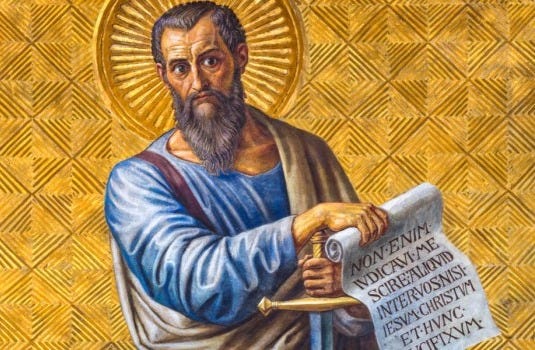
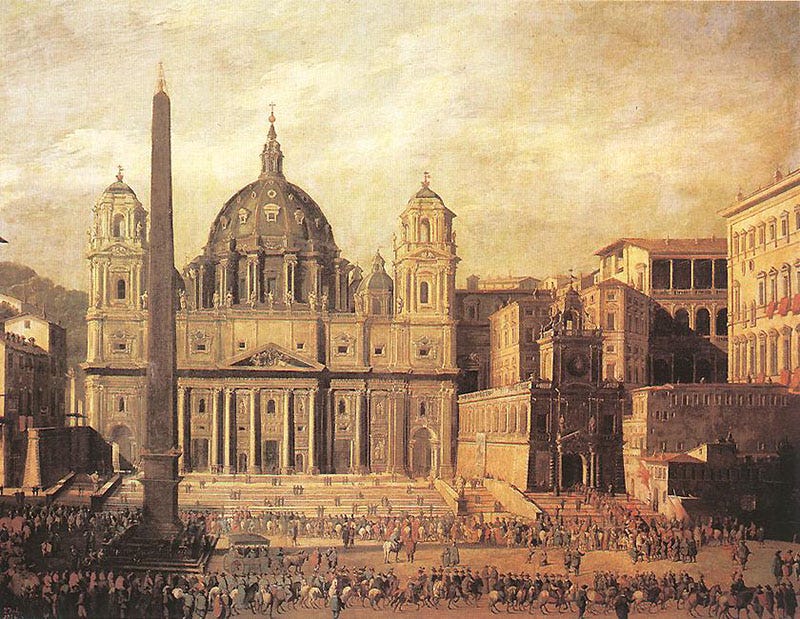
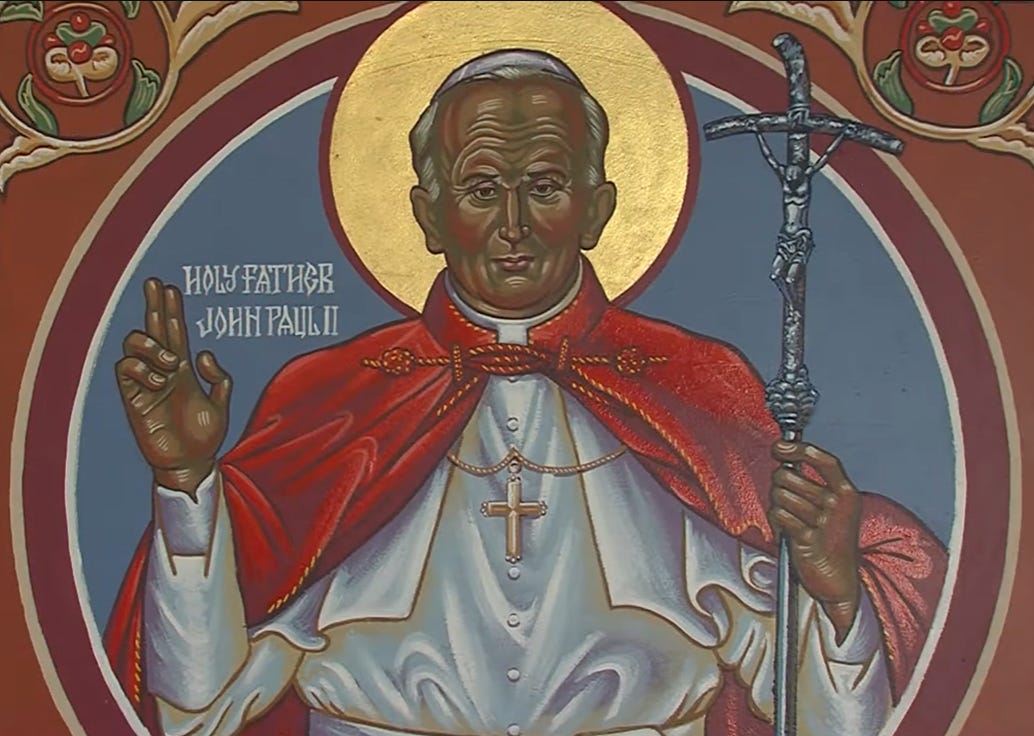
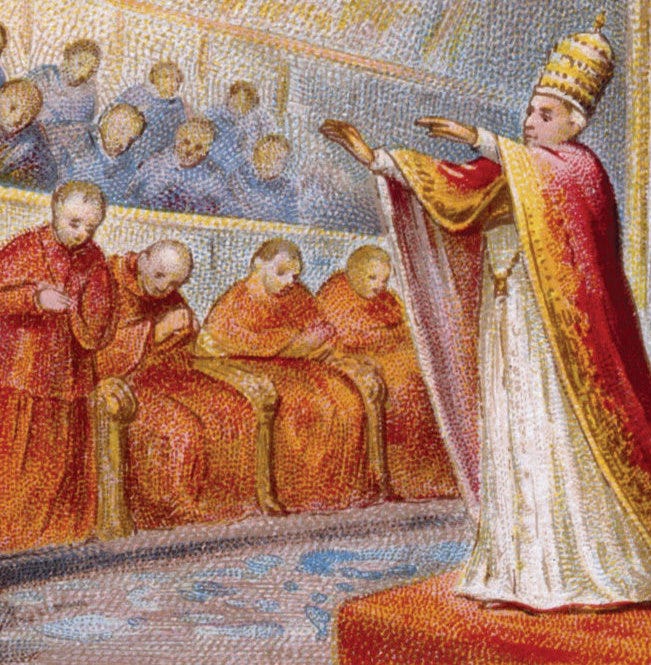

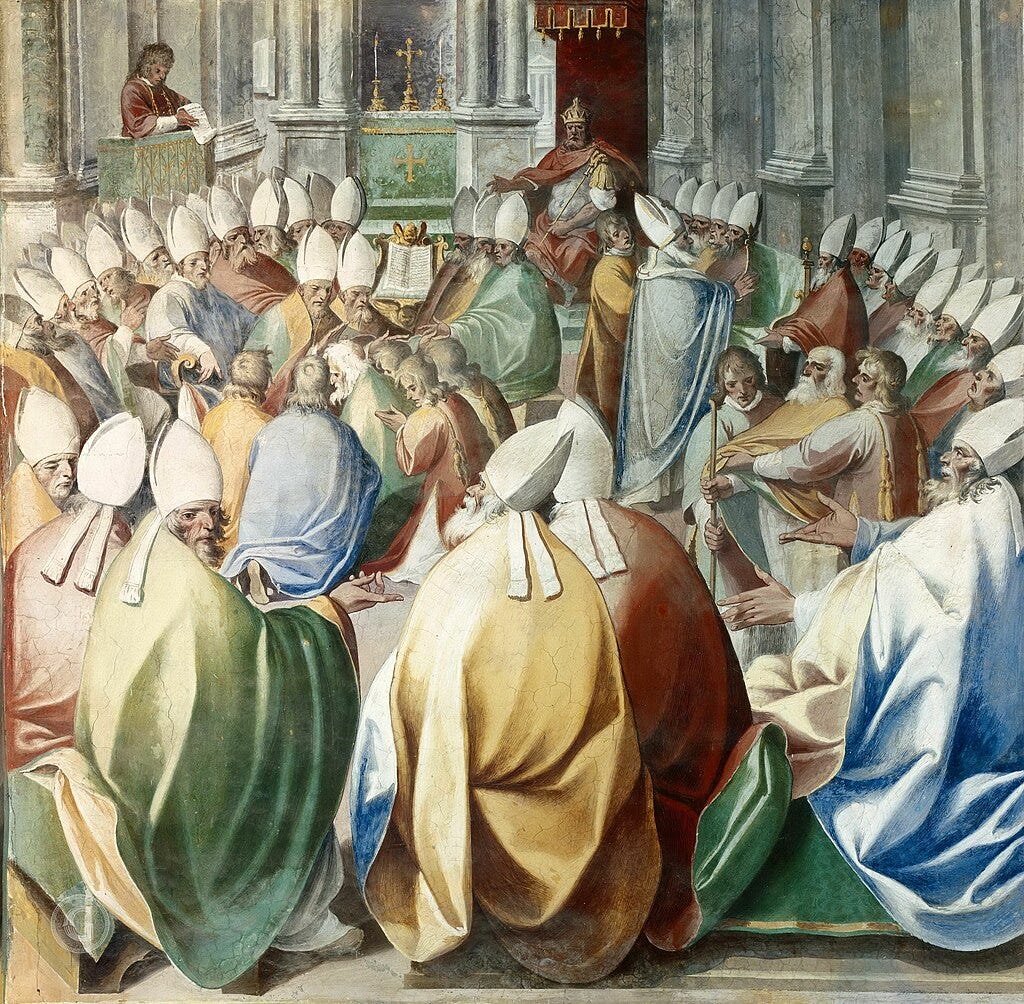
Really great stuff, as always. I really think you might be the best Catholic apologist writing on Substack right now.
’That is, it cannot be possible for one to have to choose between communion with Rome and the truth.’
My difficulty is how to square this with the seeming fact, noted by Ybarra in his Papacy book, that ’each and every time the pope was suspected of being guilty of heresy in the first millennium, even the bishops of the West, not to mention the East, felt no anxiety over removing the pope’s name from the diptychs of communion’ … ’[w]hat these actions show is that sizable portions of the Church were not convinced of an invincible rule that one had to be in communion with the pope of Rome for their eternal salvation.’
Sizable portions of the Church indeed, including canonised saints. Is this reconcilable with the Catholic position? Is suspect it is, but I’d appreciate your take.